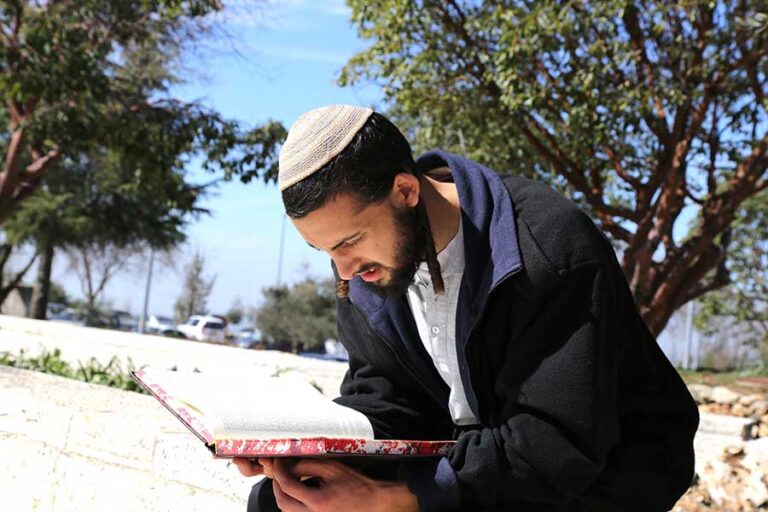On a recent Sunday afternoon, I attended three weddings. Thankfully, they were all within a half hour of each other. Each was special and wonderful, but it was a long and draining day.
The last wedding was held in a shul in Bergenfield, NJ. Before I left, I walked into a side Bais Medrash. At first, I thought there was no one there, but then I noticed a teenage boy bent over a sefer in the front. I was there for about ten minutes, and he didn’t look up once. I don’t know who he is, but he inspired me. A wedding was going on in the building, people occasionally walked in and out of the Bais Medrash, and yet that young man clad in a tee shirt and sports pants was completely immersed in his learning, oblivious to anything else going on around him.
A couple of days later, I was driving with one of my sons on a very hot day. We drove past a yeshiva bochur walking uphill, clad in his hat and jacket clutching a Gemara in hand. It’s not an unusual sight in Monsey, but at that moment it inspired me. I remarked to my son how beautiful it was to see a young man whose life revolves around the Gemara in his hand hurrying to learn Torah on a hot day.
When I walked into the pizza shop not too long ago, I noticed two high school girls holding bentchers and reciting beracha acharona meticulously. It was a chizuk to me about the importance of reciting berachos carefully even in a public and somewhat harried setting.
In Camp Dora Golding each summer, the season begins with two days of staff orientation. During his address to the staff during orientation this year, the camp’s learning director, Rabbi Noach Sauber, asked the staff how many people were hired to be learning rabbeim. As can be expected, only a few hands went up.
Rabbi Sauber then looked around the room and announced that, whether they were informed of it or not, in fact every single staff member who came to camp to work in whatever position that summer was also hired as a rebbe.
Why was that true? Because, no matter what one’s position is in camp, inevitably there are campers who are going to be looking up to him and emulating him. There are campers who dream not only of one day being a counselor, but also of running the canteen, overseeing maintenance, writing and acting in plays, painting banners, or being in charge of the go-carts or zip-line. If someone is being looked up to, he has an obligation to strive to be a proper role model.
I remember once reading about a celebrated and famous athlete who was found to be involved in unethical and illegal behavior. When asked how he could act in such a manner when kids looked up to him, his inane reply was that he never asked to become a role model.
If people look up to someone, he has a responsibility to do his utmost to try to inspire. It is irrelevant whether he wanted that role or not.
The truth is that every one of us is a role model. We can never know how we impact others, and we usually are never aware how much an act or word we did or said affected another.
The reality is that we learn from, and influence our surroundings, for good or for better.
Rav Moshe Feinstein, zt“l, noted that it is for that reason that we pray each morning (just prior to Shema) – “Our Father, the merciful Father… place in our heart understanding to learn and to teach, to guard and to do and to fulfill all the words of Your Torah with love.”
How can we ask Hashem that we merit to teach with love when most of us aren’t teachers? The obvious answer is that we all do teach – whether we mean to or not, and whether we like it or not.
If a person is particular to guard himself from lashon hora, or to not speak during davening, etc. not only will he spiritually elevate himself, but he has also become a rebbe for others in ways he may never realize.
The frightening part is that the opposite is true as well.
As the month of Elul begins, we seek to grow spiritually and become even greater than we already are. We do so not only for ourselves but also to inspire others to come closer to their living Father in Heaven.


